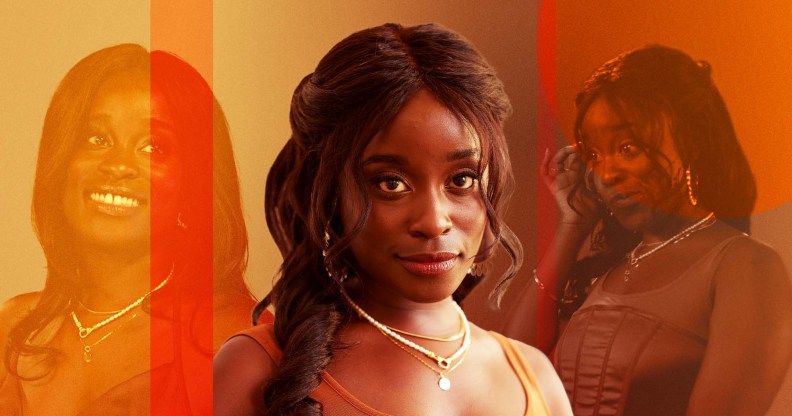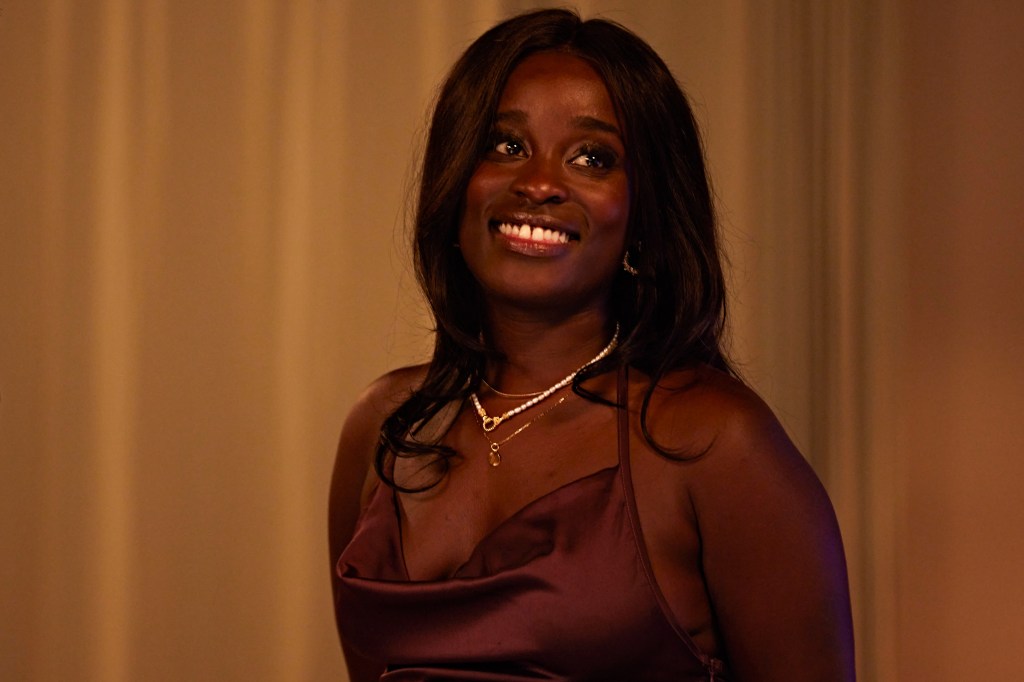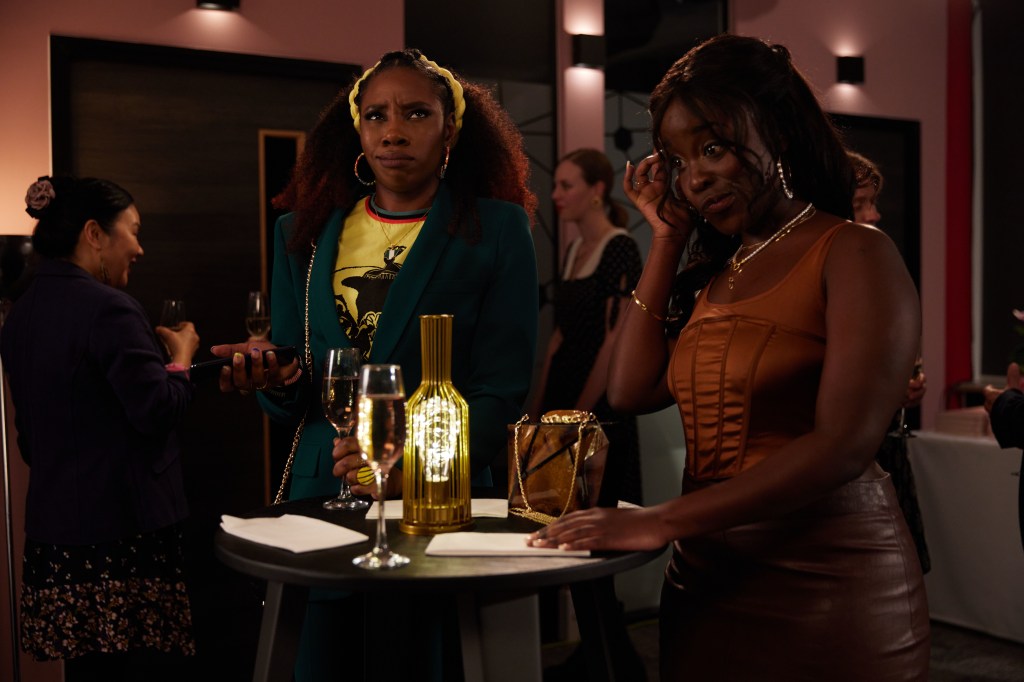Dreaming Whilst Black’s babirye bukilwa on navigating ‘unsafe spaces’ as a Black, gender-free actor

babirye bukilwa stars as Vanessa in Dreaming Whilst Black. (United Agents)
Poet, playwright and actor babirye bukilwa is playing their “dream” role in BAFTA winner Adjani Salmon’s new BBC Three series Dreaming Whilst Black.
The comedy series follows Kwabena (played by Salmon), an aspiring Black filmmaker forced to navigate the insidious institutional racism of the white-dominated arts industry while dreaming of all the ways things could have gone differently.
Despite facing a minefield of problems in his professional life, his romantic life is thriving after a chaotic meet cute with the effortlessly confident and “really hot” Vanessa (played by bukilwa).
bukilwa first met Salmon fresh from filming their breakout 2014-2016 short film-turned-series Ackee & Saltfish, when Dreaming Whilst Black was still in its original iteration as a web series. But when the show was finally green-lit for TV in 2021, bukilwa landed the role of Vanessa – though after an initial rejection and countless callbacks.
“It felt divine because my English name is Vanessa,” bukilwa tells PinkNews. But their love of the character doesn’t just start and end at the name.

“Vanessa says what she thinks and just goes for it,” bukilwa says. “She’s really funny and patient. Although she is the love interest I wanted her to be rooted in something real, more than just a piece of ass. I do think Vanessa is a dream girl – a very, very confident version of myself.”
Salmon and bukilwa’s onscreen chemistry is undeniable; the pair deftly bounce off one another with wit and charm, honeying all their interactions with the first blushes of budding love. But bringing Vanessa to life was not always straightforward.
Bukilwa’s own identity – they are non-binary or, as they also put it, “gender-free” – understandably added extra layers to their performance as a cis-gender woman and romantic lead.
“I’ve never played a non-binary character,” they say of their acting history, “so in my head I’m just playing a woman again. Sometimes it feels a bit silly. There are times when I’m in a dress and I would be like ‘Oh I’m a girl in a dress’, I’m playing into the binary. So there is an extra element of performance.
“But what I learned whilst on Dreaming Whilst Black is that my fullness as a non-binary person is what got me the job. It was all my queerness, all of my non-cisness, all my gayness. I realised ‘you just have to be you’.”
The complexities of playing a cis-gender woman manifested in the most unexpected ways while filming: for example, during intimate scenes with Salmon, bukilwa remembers thinking: “S**t, how do straight cis women kiss?”
She expands: “It was so weird, I reminded myself to just kiss this person how you would kiss anybody.
“I really resonate with the idea of bringing the fullness of my experience as someone who is gender-free to set.”

On the surface, the arts industry is appears to be moving forward, with non-binary stars such as Bella Ramsey (The Last of Us), Emma Corrin (The Crown) and Emma D’Arcy (House of the Dragon) making names for themselves in Hollywood in the last couple of years.
Elsewhere, Glee star Alex Newell and J. Harrison Ghee made history earlier this year as the first Black non-binary actors to win Tony awards, and major industry awards such as the Oscars and the BAFTAs are having their gendered categories challenged.
Despite this progress, just as in the show, when Kwabena realises that even so-called “progressive” workplaces are still racist, bukilwa remains sceptical.
“Many marginalised people are put into unsafe spaces and then they shine the spotlight on us, whilst the infrastructure of the industry is still messed up,” they explain.
“I do think the industry is changing but it is simply allowing for more unsafe spaces. It is not providing us with care. It doesn’t provide disabled people with access, or non-binary people with places where they don’t have to constantly explain their identity.
“Sometimes I feel like my existence is breast milk for people, as though I am here to educate them because I am this interesting thing that they don’t know about. That doesn’t feel nice. That doesn’t feel like care. That doesn’t feel like freedom.”
Although bukilwa holds on to the hope they might play non-binary roles in the future, right now that dream feels out of reach.
They continue: “Often when I go from non-binary roles they want the stereotypical androgynous look, because apparently when you are gender-free you can only be androgynous. But I am a curvaceous Ugandan with a fat bum and small waist – those are my genes.”
Navigating the arts industry as someone who, to the outside world, presents as a dark-skinned Black woman adds yet more intricacies.
“I still hold the dark-skinned, Black, femme experience very close to me,” they say.
Because of this, whenever a new project comes out, alongside the excitement, bukilwa also feels nervous. “It’s our faces attached to this project so someone can screenshot you and you become a meme forever,” they explain.
“[Then] that could be used in a chat room where someone’s like, ‘I hate dark-skinned Black women’. I have PTSD from my work being something for the public to consume so there’s nervousness there because misogynoir is real.”
Despite the underlying anxiety, Dreaming Whilst Black remains a project bukilwa is endlessly proud of. Their “ultimate” favourite scene is the blissful evening Vanessa and Adjani’s friend Amy (Dani Moseley) spend together.
“We were really intentional,” bukilwa says about the filming process. “We stayed over at each other’s houses that night and rehearsed and rehearsed because we just wanted to flow.
“And it solidified to me that this can happen. I can look at someone who is the mirror version of myself at the BBC – dreams do come true.”
And just as they “felt seen growing up” watching dark-skinned Black actors such as Angela Bassett, Gabrielle Union and Whoopi Goldberg, they hope to inspire the next generation of Black thespians.
“What I do hope they can take away from [my roles] is that they can. They are expansive like water. They come in so many different forms. They can be ice, steam, the river, the ocean, their talent is so fluid.”
Dreaming Whilst Black is streaming now on BBC iPlayer.
How did this story make you feel?

